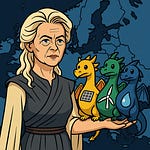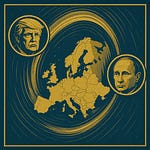The past week has sent shockwaves through the political and economic landscape of Europe and beyond. From Germany’s election reshaping European politics to the reignition of the US-China trade war and Moldova’s bold steps toward energy independence, the global order is undergoing profound shifts. While these events may seem separate, they form part of a broader picture—one of shifting alliances, emerging opportunities, and a world in flux.
In this article, we’ll break down these critical developments, analyze their ripple effects across Europe and the world, and—most importantly—look at the opportunities buried within the chaos.
Germany’s Election: A Political Reset with European Consequences
The German federal election has altered the political landscape, returning the CDU to power but with its lowest post-war result. Meanwhile, the far-right AfD surged to 20%, nearly doubling its support, becoming the second-largest party.
This election isn’t just about Germany—it’s a European turning point. The CDU’s weakened victory, combined with the rise of the AfD, reflects a broader shift in Europe’s political dynamics.
Key Takeaways:
✔ CDU’s Fragile Win (30%) – A return to power but far from Merkel-era dominance.
✔ AfD’s Historic Surge (20%) – A sign of growing populist sentiment in Germany and across Europe.
✔ SPD’s Collapse (16%) – The worst result in decades, leaving the party in crisis.
✔ Coalition Uncertainty – CDU rules out working with AfD, but other alliances are complicated.
What’s Next for Germany and Europe?
Coalition Building Will Be Slow
CDU leader Friedrich Merz has six weeks to form a government.
A "grand coalition" with the SPD is possible but ideologically challenging.
A three-party alliance (CDU-Greens-FDP) could bring fresh policies but risks instability.
What Will Merz’s Government Mean?
Pro-business policies – Lower taxes, deregulation, industrial revival.
Stricter immigration stance – A response to growing nationalist sentiment.
EU Relations – A push for stronger European defense & less US dependence.
Tougher stance on China – Alignment with US concerns over trade and technology.
Opportunities for Europe in This Shift
Germany’s pro-business focus could stimulate investment and revitalize European industrial power.
A more self-reliant EU defense strategy could reduce dependency on the US while strengthening internal cooperation.
A stronger Germany-China trade policy could benefit European companies that diversify away from Beijing.
The US-China Trade War Reignites: A Battle of Giants with Global Implications
The trade tensions between the US and China are escalating again, but this time, China is better prepared.
What’s Happening?
Trump’s New Tariffs – Billions of dollars in duties on Chinese goods.
Investment Restrictions – Blocking Chinese access to key US tech sectors.
China’s Countermoves – Tariffs on US goods, mineral export bans, and a WTO complaint.
Unlike previous trade wars, China is now:
✅ Less dependent on the US – Focused on domestic tech and supply chains.
✅ Strategically retaliating – Targeting US industries with economic countermeasures.
✅ Building alternative alliances – Strengthening ties with Africa, Latin America, and Europe.
What This Means for Europe
💡 Europe could benefit from US-China tensions by positioning itself as a neutral trading hub.
💡 German businesses may get trade opportunities as China diversifies partners beyond the US.
💡 New energy and tech partnerships may emerge between China and the EU.
Europe must balance maintaining its alliance with the US while protecting its own economic interests—a complex but potentially lucrative position.
Moldova’s Energy Revolution: Breaking Free from Russian Dependence
While the world focuses on Germany’s election and the US-China feud, a small European nation is making one of the boldest geopolitical moves of the year.
Moldova, historically heavily dependent on Russian energy, is now shifting toward the EU with a $250 million European-backed energy project.
What’s Happening?
🔹 New Moldova-Romania Power Line – Connecting Moldova to the EU energy grid.
🔹 Direct EU Financial Aid – Supporting infrastructure, social institutions, and energy security.
🔹 Reducing Russian Dependence – Ending reliance on Russian gas, with political and economic implications.
🔹 Engaging Transnistria – The EU is offering aid to Moldova’s breakaway region under strict democratic conditions.
What This Means for Europe
✅ A More Energy-Independent Eastern Europe – Strengthens EU security and weakens Russian influence.
✅ New Investment Opportunities – European energy companies can enter Moldova’s market.
✅ A Test Case for EU Expansion – Moldova’s energy shift could accelerate its EU accession talks.
This isn’t just about energy—it’s about geopolitical realignment. Moldova’s decision may inspire other Eastern European nations to reduce their reliance on Russia.
The Bigger Picture: A World in Transition
Germany’s election, the US-China trade war, and Moldova’s energy revolution aren’t isolated events—they are signs of deeper global shifts.
🔹 The European Union is at a crossroads – Can it become a stronger, independent global power?
🔹 Trade wars are reshaping alliances – The US and China battle, while Europe finds new economic opportunities.
🔹 Energy independence is becoming a political weapon – Moldova’s move could set a precedent for the region.
We are entering an era of rapid change. But change brings opportunities—for businesses, policymakers, and citizens who can see beyond the headlines.
Final Thoughts: Why This Moment Matters
Europe has a rare chance to shape its future:
✅ Germany’s election could push for new EU policies and economic strategies.
✅ The US-China trade war opens space for Europe to strengthen its trade influence.
✅ Moldova’s energy play shows that even small nations can make bold moves.
These uncertain times are also moments of great opportunity. Those who can adapt, think strategically, and act decisively will define Europe’s future.
🔹 Which of these shifts do you think will have the biggest impact on Europe? Let’s continue the conversation via chat or on Instagram!












